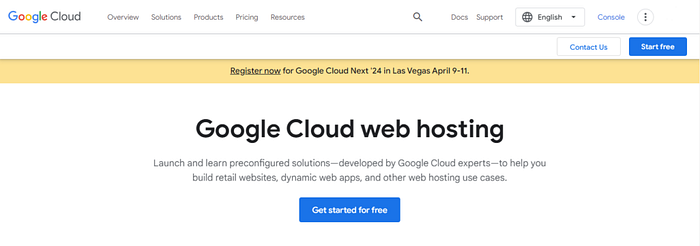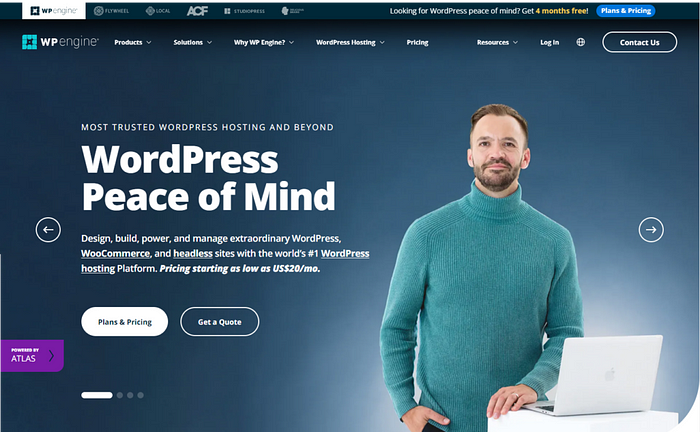People expect fast load times and superb website security, which is why choosing the right hosting server is crucial for your users’ experience. If your hosting service provider delivers subpar performance, consider switching to a better platform. Partnering with a web development company will help you pinpoint your site’s needs so you can find the best web hosting server.
When you purchase a hosting plan, you rent space on a platform’s server so users can access your website 24/7. However, the server you choose can affect user experience. That’s why it’s essential to know the various hosting types and key considerations you must look into to help you select the best hosting plan.

Source: WebsiteSetup.
Types of Hosting Servers
To help you pick the best web hosting server and plan, let’s discuss how each hosting type can benefit your website:
Shared Hosting
Users often choose shared hosting for its affordability and ease of use. A single server hosts multiple websites where users share resources like disk space and bandwidth. One perk to choosing this hosting type is that its users share the maintenance cost, so you get to save more compared to having a dedicated server.
However, the downside to shared hosting is that splitting the resources can affect your site’s performance. For instance, when there are traffic spikes or other users have a resource-intensive website. Thus, choose shared hosting if you have a small to medium-sized website that gets moderate traffic.
VPS Hosting
VPS hosting separates one physical server into multiple private servers. You’ll have better loading speeds and uptime compared to a shared hosting plan. Hence, it suits websites with medium-level traffic that don’t need the resources of a dedicated server. The only requirement to this is that you have server administration experience.
Dedicated Hosting
If you want complete control over your server’s resources and settings, consider dedicated hosting. The plan provides you with a physical server to ensure the website has a high-performance level.
Dedicated hosting works well for large websites with high traffic since a server won’t share resources. The plan may cost a pretty penny, but it’s worth it for its unmatched performance and customization options.You also need to have server administration experience or hire one.
Key Considerations for Choosing the Best Web Hosting Server
Next, let’s look at the factors you must look into when choosing the best web hosting server for your site:
Website Requirements
Before you build a website or migrate it to a new web hosting service provider, it’s essential to do an assessment. The process makes it easier to decide which hosting plan can do the job.

That’s because different websites can have varying resource requirements. A web development company will consider the following factors when choosing a hosting server:
Traffic volume;
Resource usage;
Content types;
Databases, and
Software applications.
Performance and Speed
Users expect your desktop site to load in two seconds, so the performance and speed of your servers can make or break their web experience. When choosing a web hosting server, evaluate its performance capabilities, including:
CPU processing power;
RAM availability;
Disk I/O speeds, and
Network connectivity.

Source: Gitnux.
In addition, your chosen web hosting server should have optimized software, hardware, and network infrastructure. Thus, you can ensure fast loading times, high responsiveness, and a smooth user experience. A speedy website can also benefit your SEO rankings because search engines favor sites that load content quickly.
Reliability and Uptime
Think about it: users won’t see your content or browse your products if your website is frequently down. According to Web Hosting Statistics, hourly server downtime can cost you $301,000 to $400,000.
Looking for a web hosting service provider with a reliable uptime is essential so you don’t risk losing significant revenue. In addition, don’t forget to consider factors like:
Redundant hardware;
Data center facilities;
Network stability, and
Backup systems.
Scalability
Another factor you must consider when choosing a web hosting server is its scalability. A scalable server makes it easier for your site to handle increasing traffic and demand. If your site gets a sudden flow of visitors, it can retain its performance and uptime.
Remember to choose a web hosting service provider that offers the following:
Scalable resources;
Traffic handling;
Geographic scaling;
Auto-scaling features, and
Performance monitoring.
Security Features
When looking for a hosting service provider, a web development company will look into how the platform handles its servers’ security. It’s to ensure your site and customer’s data are safe. Consider hosting servers that offer security features like:
Firewalls;
DDoS protection;
Intrusion detection;
Malware scanning, and
Customer Support
Consider how the platform provides customer support when choosing a web hosting server. You’ll want a provider that has a support team available 24/7 so that when your server has an issue, you can quickly contact the platform. Ideally, their team is available via various channels, such as:
Live chat;
Email;
Phone, and
Support tickets.
Which Server is Best For Web Hosting?
Now you know which types and factors to look into when choosing the best web hosting server for your website. Let’s check out the top web hosting service providers:
Calico Domains

The Calico Domains platform offers various hosting services, including shared, VPS, and dedicated server hosting. It provides the following features:
Domain Services;
Website builder;
WordPress optimization;
Free domain;
Unlimited bandwidth;
SSL Certificate
Web Security
Backup and restore;
Email hosting, and
World Class 24/7 customer support.
DigitalOcean

DigitalOcean offers cloud computing solutions to help developers and businesses in managing and scaling applications in the cloud. Their services include cloud website hosting and VPS hosting services that offer the following features:
One-click installations;
Isolated Droplets;
Resource scalability;
Automated backups, monitoring, and security features;
Global data centers, and
Transparent pricing and flexible payment options.
Google Cloud Hosting

Google Cloud Hosting offers various cloud computing services. The platform provides a variety of cloud hosting solutions for websites and applications with the following features:
Domain name registration;
Security features, and
Scalability.
WP Engine

WP Engine is a trusted managed hosting provider specializing in WordPress websites. Their web hosting service provides an infrastructure specifically for WordPress sites. In addition, their package consists of the following features:
Automated updates and backups;
Global CDN;
DDoS Protection and managed Web Application Firewall (WAF);
White-glove onboarding, and
24/7 customer support.
Amazon Web Services

Amazon offers cloud computing solutions through Amazon Web Services (AWS). They provide hosting services, including simple web, single-page web app, and enterprise web hosting, with features like:
Broad platform support;
Worldwide data centers, and
Flexible pricing model.
Aside from web hosting, AWS also offers cloud scalability solutions, that’s why most users and businesses prefer to acquire their services.
SiteGround

SiteGround is a popular web host for users and small businesses. They provide several hosting services, like web hosting, cloud hosting, and reseller hosting, with the following features:
Automatic scaling;
Security features;
Managed WordPress and WooCommerce Hosting;
Dedicated servers;
Domain registration, and
24/7 customer support.
Hostinger

Hostinger is a Lithuania-based tech startup that offers various web hosting solutions. The company is popular for its developer-friendly hosting services. They currently offer web, VPS, cloud, and business email hosting with the following features:
Domain registration;
Website builder;
Security features;
Managed WordPress hosting;
24/7 customer support.
Are You Using the Best Web Hosting Server for Your Website?
To check if your website has the best web hosting server, you must consider several factors, like performance and uptime. Your chosen hosting platform impacts your site’s performance and security, so choose a service you can trust.
A web development company in the Philippines can guide you in the right direction when choosing a server for your site.
